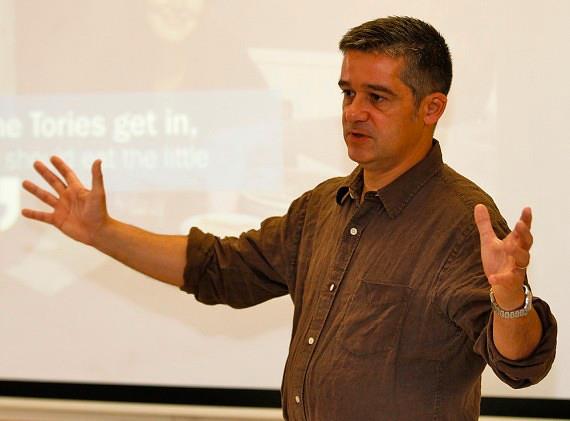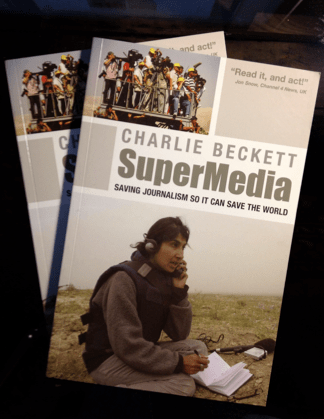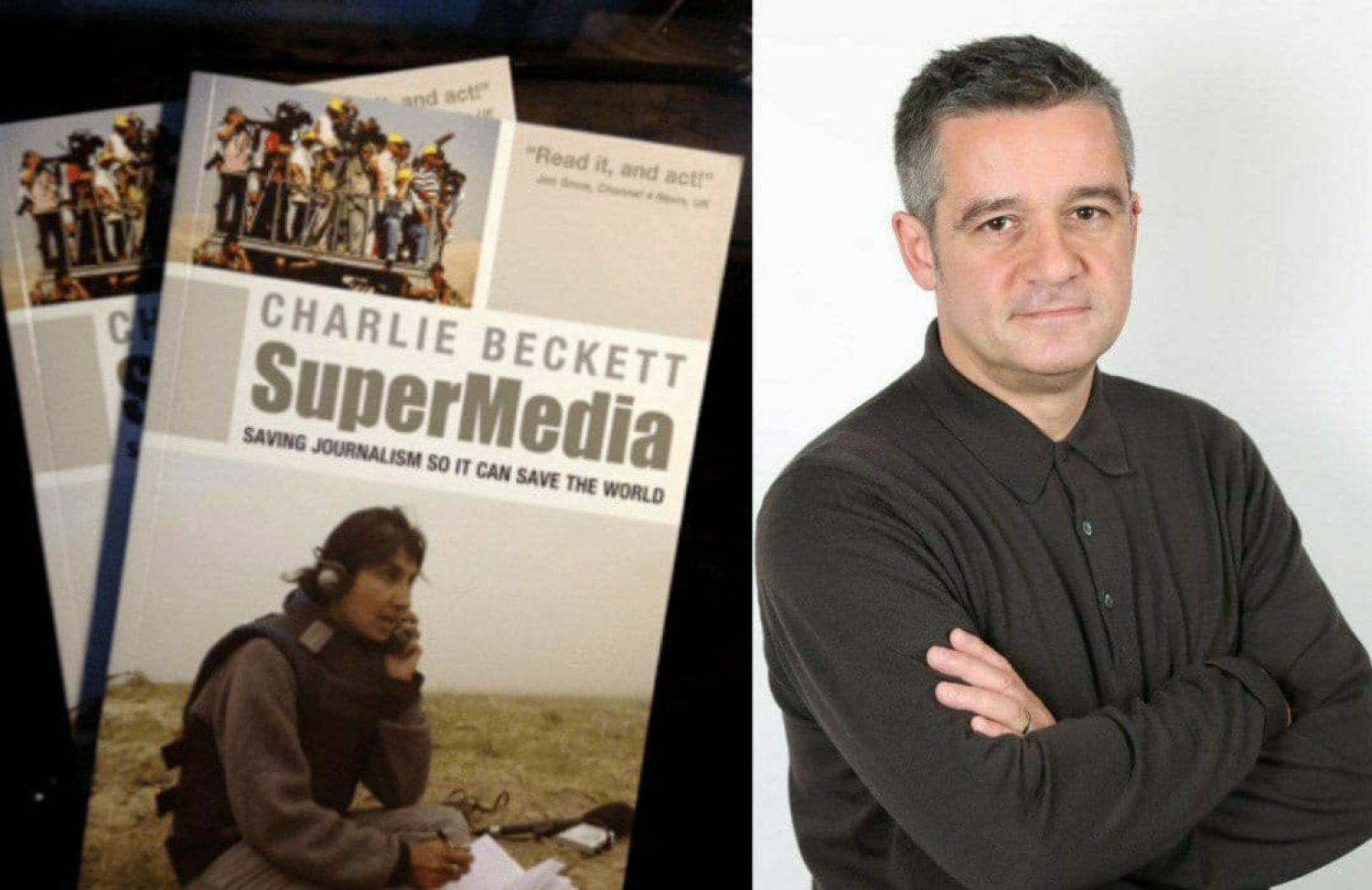Ethical Charter – (Exclusive)
“Charlie Beckett” asks readers to imagine an issue like the warming of our planet in all its complexity and global nature in essence, and then to think, how would it be easier to deal with it if we had a networked journalism that adopted a “new charter based on exchange with a global interactive audience?”
“I am well aware of the sordid facts of the press, whether it be in a well – developed newsroom in London, in an African village or in India’s large cities, but I am also convinced that the press offers great hope for all those places,” says the Author.
Based on his extensive experience, and with strict objectivity, the well-known journalist and professor of information and communication at the London School of Economics, Charlie Beckett, in his book “Super Media,” presents the problems and challenges facing journalism on the planet, today, speaking of the paths that journalism must take, as it has become an “enlightenment process,” not just a “media process, “According to the American journalist and critic Jeff Jarvis.
Saving Journalism So It Can Save the World
Beckett’s book has a headline that referred to the primary idea: “Super Media: Saving Journalism So It Can Save the World”
Charlie Beckett wrote remarkable ideas in his book, not just as a journalist, but as a citizen of this world. He says: “Journalists always hear that the news media have tremendous power, to shape society and events, to change lives and history, so why are we as a society indifferent to the future of journalism itself?”
The author does not claim to be neutral in his book, but rather to seek impartiality, accuracy and inclusiveness. He argues that the book does not provide a chronicled of journalism, nor does it examine its current state at length, but rather seeks to understand the “Editorial skills” that create what he calls “good journalism.”
The book talks about “digital journalism” in particular and of “networked journalism” produced by the media in partnership with the public, and deals with the “press policy,” its impact and its ability to manage change, the motivation of the book achievement is the conviction that journalism is at a unique moment in human history.
The author points out that there are enormous threats to the quality and potential of the news media. The values of openness, pluralism and quality are all controversial and Disputable, sometimes from familiar sources such as commercialization or political authoritarianism, at other times, the threats are to confront new problems, such as the fragmentation of the public, which follows the possibility of choice, The author does not consider that tampering with the end of a golden age for dedicated journalism in quality standards is a matter of sufficient criticism to the press today, His fears are based on politics rather than past nostalgia, and he affirms his strong belief that, in the midst of the digital development of journalism, we must preserve the values that support a free press as a successful part of a prosperous society, and we should not allow fear to shape the future.
Saving the press is Charlie Beckett’s obsession, and he sees that we have 5 or 10 years to do so, because the press can actually save the world.

Media evaluation
Beckett believes that it is very difficult to have a neutral view of the media, as those working in it tend to form exaggerated opinions about the state of the media, based on their aspirations and experiences, they view things from the perspective of a particular sector of their profession (radio, electronic journalism, etc.), this is in addition to the bias towards the subject of their specialization (politics, arts, sports … etc.), and the journalist also always reflects the trends of his time, and while it is their duty to seek impartiality, but despite that, if you ask them about their lives in their work In their field, you will usually find biased opinions expressing a personal point of view, and their opinion may even be emotional and vulgar.
Regarding evaluation, the writer calls for to resort to the Media users as, readers, viewers or listeners, as well as politicians, advertisers and experts, all of whom have very strong and astonishingly subjective views of the media.
Media Literacy
The book focuses on a very important idea, which is, as the author called it “media illiteracy,” and asserts that there is no hope of networked journalism if journalists and people are not qualified for the task.
This has to do with the skills of journalists, Beckett says, and while it is a big issue in developing economies, and less developed societies in particular, the need for more “media literacy” becomes a “global need.”
He asserts that journalists and the public need to have a general idea of their duties and rights as well, and stresses his belief that journalists must have an idea of what is neutral and what is right. As they become more integrated into society through the process of journalism, in the end they must appeal to their work ethic inside them, as well as media literacy courses to teach the principles of journalistic diversity and conduct practical and ethical training.
In the author’s view, this would be a hard balance to achieve, and it would be even more difficult to define boundaries and establish professional codes of conduct, but in the end, journalists had no choice their work will become more intertwined whether they like it or not.

Media evaluation
Beckett believes that it is very difficult to have a neutral view of the media, as those working in it tend to form exaggerated opinions about the state of the media, based on their aspirations and experiences, they view things from the perspective of a particular sector of their profession (radio, electronic journalism, etc.), this is in addition to the bias towards the subject of their specialization (politics, arts, sports … etc.), and the journalist also always reflects the trends of his time, and while it is their duty to seek impartiality, but despite that, if you ask them about their lives in their work In their field, you will usually find biased opinions expressing a personal point of view, and their opinion may even be emotional and vulgar.
Regarding evaluation, the writer calls for to resort to the Media users as, readers, viewers or listeners, as well as politicians, advertisers and experts, all of whom have very strong and astonishingly subjective views of the media.
Media Literacy
The book focuses on a very important idea, which is, as the author called it “media illiteracy,” and asserts that there is no hope of networked journalism if journalists and people are not qualified for the task.
This has to do with the skills of journalists, Beckett says, and while it is a big issue in developing economies, and less developed societies in particular, the need for more “media literacy” becomes a “global need.”
He asserts that journalists and the public need to have a general idea of their duties and rights as well, and stresses his belief that journalists must have an idea of what is neutral and what is right. As they become more integrated into society through the process of journalism, in the end they must appeal to their work ethic inside them, as well as media literacy courses to teach the principles of journalistic diversity and conduct practical and ethical training.
In the author’s view, this would be a hard balance to achieve, and it would be even more difficult to define boundaries and establish professional codes of conduct, but in the end, journalists had no choice their work will become more intertwined whether they like it or not.


